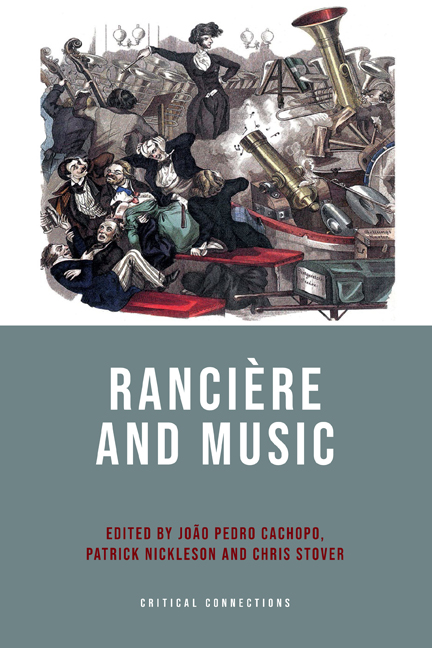Book contents
- Frontmatter
- Contents
- List of Examples
- Acknowledgements
- Notes on Contributors
- Introduction
- Part I: Music and Noise
- 1 Musique concrète and the Aesthetic Regime of Art
- 2 ‘Rip it up and start again’: Reconfigurations of the Audible under the Aesthetic Regime of the Arts
- 3 A Lesson in Low Music
- Part II: Politics of History
- 4 Wandering with Rancière: Sound and Structure under the Aesthetic Regime
- 5 Staging Music in the Aesthetic Regime of Art: Rancière, Berlioz and the Bells of Harold en Italie
- 6 Rancière on Music, Rancière’s Non-music
- 7 Coloured Opera and the Violence of Dis-identification
- Part III: Politics of Interaction
- 8 Musical Politics in the Cuban Police Order
- 9 Rancière and Improvisation: Reading Contingency in Music and Politics
- 10 Rancière’s Affective Impropriety
- Part IV: Encounters and Challenges
- 11 Rancière, Resistance and the Problem of Commemorative Art: Music Displacing Violence Displacing Music
- 12 Stain
- 13 On Shoemakers and Related Matters: Rancière and Badiou on Richard Wagner
- 14 Roll Over the Musical Boundaries: A Few Milestones for the Implementation of an Equal Method in Musicology
- Afterword
- A Distant Sound
- Works Cited
- Index
6 - Rancière on Music, Rancière’s Non-music
Published online by Cambridge University Press: 03 October 2020
- Frontmatter
- Contents
- List of Examples
- Acknowledgements
- Notes on Contributors
- Introduction
- Part I: Music and Noise
- 1 Musique concrète and the Aesthetic Regime of Art
- 2 ‘Rip it up and start again’: Reconfigurations of the Audible under the Aesthetic Regime of the Arts
- 3 A Lesson in Low Music
- Part II: Politics of History
- 4 Wandering with Rancière: Sound and Structure under the Aesthetic Regime
- 5 Staging Music in the Aesthetic Regime of Art: Rancière, Berlioz and the Bells of Harold en Italie
- 6 Rancière on Music, Rancière’s Non-music
- 7 Coloured Opera and the Violence of Dis-identification
- Part III: Politics of Interaction
- 8 Musical Politics in the Cuban Police Order
- 9 Rancière and Improvisation: Reading Contingency in Music and Politics
- 10 Rancière’s Affective Impropriety
- Part IV: Encounters and Challenges
- 11 Rancière, Resistance and the Problem of Commemorative Art: Music Displacing Violence Displacing Music
- 12 Stain
- 13 On Shoemakers and Related Matters: Rancière and Badiou on Richard Wagner
- 14 Roll Over the Musical Boundaries: A Few Milestones for the Implementation of an Equal Method in Musicology
- Afterword
- A Distant Sound
- Works Cited
- Index
Summary
Rancière is the first to admit that he is ‘neither a musician nor a music historian’, and indeed, the subject I propose here – ‘Rancière on music’ – risks curtailing itself through a relative absence of materials. A seminar paper from 2003 on contemporary music and history remains Rancière's only sustained discussion of music, and even here he does not so much tackle a music-specific history as unpack a more general historiography through approximate musical contexts. The unobtrusive conjunction of our volume’s title, Rancière and Music, thus forecasts a productive convergence between the philosopher and his most evaded art form with an optimism that in some ways contradicts Rancière's own confessed reticence. By his own account, this small word ‘and’ paradoxically includes a very specific exclusion, a silent but palpable disjunctive conjunction: Rancière or Music. Precisely because the applications of Rancière's political aesthetics are so demonstrably varied – and even, as my colleagues have shown here, musical – the need to hear Rancière speak on the art of music is all the more urgent, as is the suspicion that Rancière's relationship to music is not only diffident but perhaps also deeply uneasy. The fact that Rancière says little about music is a statement in and of itself, and it is this statement that I will pursue here.
Directing Rancière's words to speak more directly to music in some respects seems more of an exercise in ventriloquism than textual interpretation. However, this strategy might in fact prove enlightening; after all, the philosopher's own indirect discourse practises a type of ventriloquism that invites exactly this approach. Indeed, Rancière's ambivalent relationship to music is not entirely his own but rather one that he inherits from his source materials. For example, the project of intellectual emancipation that Rancière adopts from his nineteenth-century counterpart Joseph Jacotot relies on a source that is vehemently opposed to music: François Fenélon's epic novel Les Aventures de Télémaque, which already at the time of its first publication in 1699 defined itself as a manual for emancipation through an explicitly anti-music moral. Fenélon's controversial novel endorses a strict political-aesthetic order in which music represents a corrupting influence. Thanks to its symbolic authority in Rancière's foundational text The Ignorant Schoolmaster, the novel inevitably transfers its antipathy towards music to the Jacotot–Rancière adventure.
- Type
- Chapter
- Information
- Ranciere and Music , pp. 138 - 155Publisher: Edinburgh University PressPrint publication year: 2020



